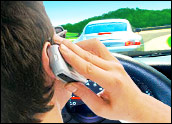
Californian Governor Arnold Schwarzenegger signed a new law on Thursday banning teenage drivers from using all electronic devices while behind the wheel.
Beginning July 1, 2008, drivers under 18 will be forbidden from using cell phones, pagers, laptops or other electronic devices while driving. Violations will result in a US$20 fine for the first offense and $50 for each additional offense, with exemptions only for emergency calls.
The law is what’s known as a “secondary offense law,” meaning that police can’t pull a teen over just for using a banned device. What they can do, however, is cite a teen under the law if he or she is pulled over for other reasons, such as driving erratically.
“The simple fact is that teenage drivers are more easily distracted,” Gov. Schwarzenegger said. “They are young, inexperienced and have a slower reaction time. We want to eliminate any extra distractions so they can focus on paying attention to the road and being good drivers,” he said.
Hands-Free for Adults
Last year Gov. Schwarzenegger signed a related bill, also due to take effect next July, requiring all drivers to use hands-free devices while talking on cell phones. Both bills were authored by state Senator Joe Simitian (D-Palo Alto).
Starting in July, “if you’re 18 and over, it’s hands free — if you’re under 18, it’s hands off,” Simitian told TechNewsWorld.
“I’m very pleased this bill got signed this year and will take effect at the same time as the hands-free law,” Simitian said. “This one had no opposition, and was passed on a bipartisan vote.”
Sobering Statistics
The numbers motivating the bill were very compelling, Simitian added. For example, traffic accidents are the No. 1 cause of death for teens across country; crash rates for 16-year-olds are five times greater than those for 18-year-olds and ten times greater than those for adults over 18, he said.
The real-life stories are just as sobering. In June, five teens in a single car were killed in a crash in western New York moments after a text message was sent by the driver, he explained.
Ford Motor research indicates that teens are four times more distracted by cell phone calls than older drivers are, he added. “It’s not clear if that’s because teens haven’t fully mastered coordinating all the parts of driving, or if it’s a function of brain development,” Simitian explained. “There’s some very good science suggesting that the portion of the brain governing risky behavior is not fully developed until a person reaches their twenties.”
Hang Up the Phone
Currently, 15 states and the District of Columbia have laws restricting the use of wireless communication devices by new and inexperienced drivers. The National Transportation Safety Board has urged all states to enact legislation to prohibit inexperienced drivers from using cell phones and other mobile service devices while driving.
“If we can just get kids to put down their cell phones and PDAs, we can save a lot of lives,” Simitian said.
“We’re losing too many teens because they are too distracted behind the wheel by all the electronics they have to play with these days,” Doris Brown, program consultant with Partners for Safe Teen Driving, told TechNewsWorld.
“It’s an awesome thing Governor Schwarzenegger has done, and I applaud him for taking the initiative,” Brown added.
Focus on Messaging
Text messaging by drivers of any age at the wheel has also come under increasing scrutiny, and many states are considering legislation banning that practice for all drivers, Chris Hazelton, senior analyst for mobile device technology and trends with IDC Research, told TechNewsWorld.
Such laws would affect not just teens but also businesspeople sending e-mails via mobile devices, he noted.
Taken together, these legislative trends will likely further the evolution of mobile devices, he predicted, with a focus in particular on how users interact with them.
“This will be a driver of change in the way people interact with their devices, and will give power to companies that offer voice-controlled and voice-enabled devices,” he said. “People definitely need to be totally focused on driving.”





















































